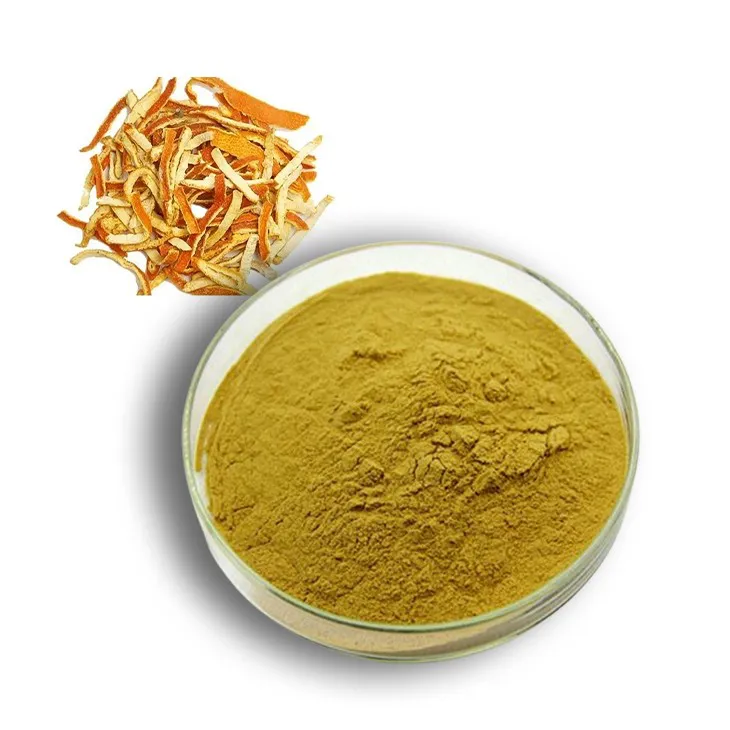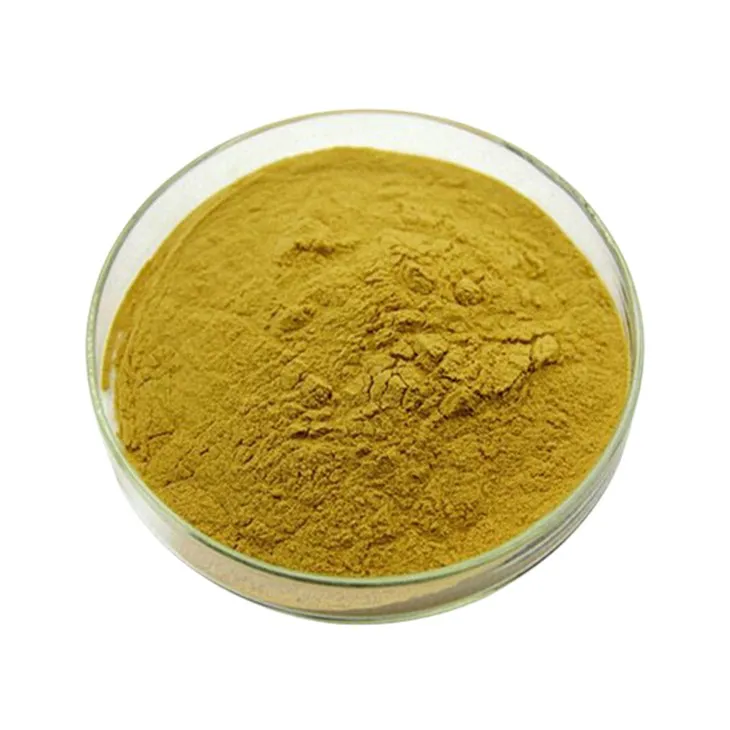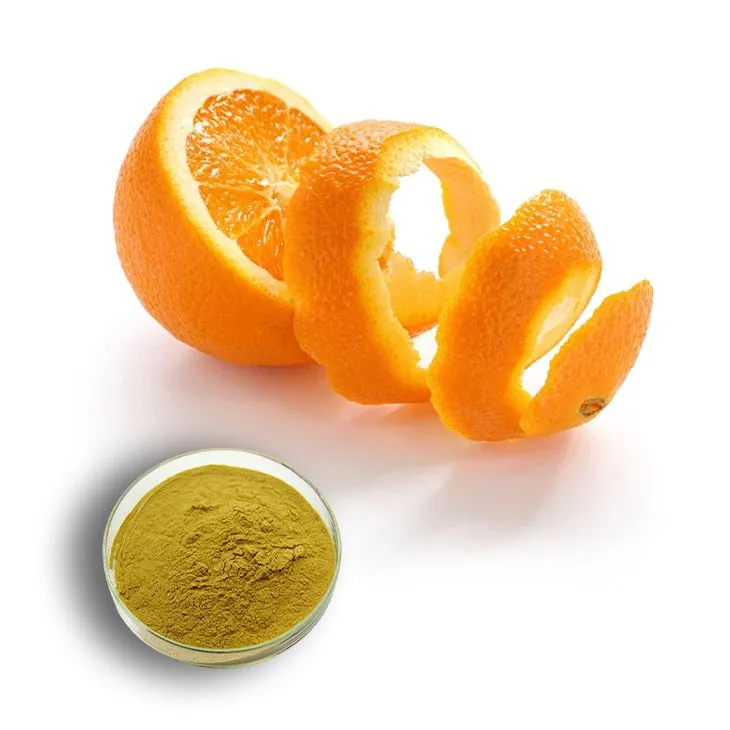- 0086-571-85302990
- sales@greenskybio.com
The Best Natural Source of Hesperidin.
2024-12-02

Introduction
Hesperidin is a flavanone glycoside that has been receiving increasing attention in the field of health and nutrition. It is known for its various beneficial properties, such as antioxidant, anti - inflammatory, and cardiovascular - protective effects. While synthetic Hesperidin is available, many people prefer to obtain it from natural sources. In this article, we will explore the best natural sources of Hesperidin, with a focus on the world of citrus fruits.

Orange Peel: A Prominent Source
1. Hesperidin Content
Orange peel is an outstanding natural source of hesperidin. It contains a relatively high concentration of this flavanone glycoside. The peel, which is often discarded in the consumption of oranges, holds a wealth of hesperidin. Studies have shown that the hesperidin in orange peel can be effectively extracted and utilized for various health - promoting purposes.
2. Role in Enhancing Capillary Permeability
One of the significant aspects of hesperidin from orange peel is its role in enhancing capillary permeability. The capillaries are the tiniest blood vessels in the body, and proper permeability is crucial for maintaining normal physiological functions. Hesperidin helps to strengthen the walls of the capillaries, making them less likely to leak and more efficient in nutrient and oxygen exchange. This can be particularly beneficial for individuals with circulatory problems or those at risk of developing such issues.
3. Other Potential Health Benefits
Besides its effect on capillary permeability, hesperidin from orange peel may also offer other health benefits. It has antioxidant properties, which means it can help to neutralize harmful free radicals in the body. Free radicals are unstable molecules that can cause damage to cells, proteins, and DNA, leading to various diseases and aging. By scavenging these free radicals, hesperidin may contribute to overall health and longevity.

Grapefruits: Another Citrus Source
1. Hesperidin Presence
Grapefruits are another citrus fruit that contains hesperidin. The compound is present in the flesh, peel, and seeds of the grapefruit, although the concentration may vary. The unique taste and nutritional profile of grapefruits make them not only a delicious addition to the diet but also a potential source of hesperidin.
2. Cholesterol - Lowering Effects
The hesperidin in grapefruits may contribute to cholesterol - lowering effects. High cholesterol levels are a risk factor for heart disease, and finding natural ways to manage cholesterol is of great importance. Hesperidin has been shown to interfere with the absorption of cholesterol in the intestine and also promote the breakdown of cholesterol in the liver. This dual action can help to reduce blood cholesterol levels, especially low - density lipoprotein (LDL) cholesterol, which is often referred to as "bad" cholesterol.
3. Impact on Metabolism
Grapefruit hesperidin may also have an impact on metabolism. It has been suggested that it can influence the body's energy - burning processes, potentially leading to increased calorie expenditure. This could be beneficial for those looking to manage their weight or improve their metabolic health. However, more research is needed to fully understand the mechanisms underlying this effect.

Pomelos: Rich in Hesperidin
1. Hesperidin Abundance
Pomelos, with their thick peels, are rich in hesperidin. The large size of pomelos means that there is a significant amount of hesperidin available per fruit. The peel, in particular, is a valuable source of this flavanone glycoside. Extracting hesperidin from pomelo peels could be a sustainable way to obtain this beneficial compound.
2. Combating Oxidative Stress
Hesperidin in pomelos can play a part in combating oxidative stress in the body. Oxidative stress occurs when there is an imbalance between the production of free radicals and the body's antioxidant defenses. This can lead to cellular damage and various health problems, such as inflammation, neurodegenerative diseases, and cancer. Pomelo - derived hesperidin can act as an antioxidant, helping to restore the balance and protect the body from oxidative damage.
3. Digestive Health Benefits
There may also be potential benefits for digestive health. Some studies suggest that hesperidin can have a positive effect on the gut microbiota, promoting the growth of beneficial bacteria and inhibiting the growth of harmful ones. A healthy gut microbiota is essential for proper digestion, nutrient absorption, and immune function.

How to Incorporate These Sources into the Diet
1. Orange Peel
While it may not be common to eat orange peel directly, there are ways to incorporate it into the diet. One option is to make orange peel tea. Simply dry the orange peel, then steep it in hot water for a few minutes. This tea can be a rich source of hesperidin. Another way is to use grated orange peel in baking or cooking. For example, adding orange peel to muffins or cakes can not only enhance the flavor but also provide a dose of hesperidin.
2. Grapefruits
Grapefruits can be easily incorporated into the diet as a whole fruit. They can be eaten for breakfast, as a snack, or in fruit salads. Grapefruit juice is also a popular option, although it should be consumed in moderation as it can interact with certain medications. For those who do not like the taste of whole grapefruits, grapefruit segments can be added to smoothies for a convenient and nutritious way to obtain hesperidin.
3. Pomelos
Pomelos can be eaten in a similar way to grapefruits. The segments can be consumed on their own or added to fruit salads. Pomelo juice is also available, although it may not be as common as grapefruit juice. Pomelo peel can be used to make marmalade, which can be spread on toast or used in other recipes. This allows for the utilization of the hesperidin - rich peel in a more palatable form.
Precautions and Considerations
1. Allergic Reactions
Some people may be allergic to citrus fruits, which could include reactions to hesperidin - rich parts such as the peel. Allergic symptoms may include skin rashes, itching, swelling, or difficulty breathing. If you have a known allergy to citrus fruits, it is important to avoid consuming these sources of hesperidin or consult a healthcare provider before doing so.
2. Interaction with Medications
Grapefruit and its components, including hesperidin, are known to interact with certain medications. For example, it can interfere with the metabolism of some drugs, leading to increased or decreased drug levels in the body. This can potentially cause adverse effects or reduce the effectiveness of the medications. If you are taking any medications, it is crucial to check with your doctor or pharmacist to see if there are any potential interactions with citrus - derived hesperidin.
Conclusion
Orange peel, grapefruits, and pomelos are excellent natural sources of hesperidin. Each offers unique health benefits, from enhancing capillary permeability to lowering cholesterol and combating oxidative stress. By incorporating these citrus fruits and their by - products into the diet in a safe and appropriate way, individuals can potentially take advantage of the beneficial properties of hesperidin. However, it is important to be aware of any precautions, such as allergic reactions and medication interactions, to ensure a healthy and positive experience. Overall, these natural sources of hesperidin provide a great alternative for those seeking natural ways to improve their health and well - being.
FAQ:
What are the main natural sources of hesperidin?
Orange peel, grapefruits, and pomelos are the main natural sources of hesperidin. Orange peel is known for its role in enhancing capillary permeability. Grapefruits may contribute to cholesterol - lowering effects due to hesperidin. Pomelos, with their thick peels, are rich in hesperidin and can combat oxidative stress in the body.
Why is orange peel considered an excellent source of hesperidin?
Orange peel is considered an excellent source of hesperidin because it has been studied for its role in enhancing capillary permeability. The hesperidin present in orange peel can have beneficial effects on this aspect of health.
How does hesperidin in grapefruits affect cholesterol levels?
The hesperidin in grapefruits may contribute to cholesterol - lowering effects. However, the exact mechanism is complex and may involve interactions with various physiological processes in the body related to lipid metabolism.
What role does hesperidin from pomelos play in the body?
Hesperidin from pomelos can play a part in combating oxidative stress in the body. Oxidative stress is associated with various health problems, and the presence of hesperidin in pomelos may help to counteract it.
Are there other natural sources of hesperidin besides citrus fruits?
While citrus fruits are the most well - known sources, there may be other plants that also contain hesperidin, but they are not as commonly recognized. Citrus fruits, especially orange peel, grapefruits, and pomelos, are the primary natural sources that are often focused on in research and health - related discussions.
Related literature
- Hesperidin: A Review on its Pharmacological and Therapeutic Effects"
- "The Role of Hesperidin in Citrus Fruits and its Health Benefits"
- "Hesperidin and its Potential in Improving Vascular Health"
- ▶ Hesperidin
- ▶ Citrus Bioflavonoids
- ▶ Plant Extract
- ▶ lycopene
- ▶ Diosmin
- ▶ Grape seed extract
- ▶ Sea buckthorn Juice Powder
- ▶ Fruit Juice Powder
- ▶ Hops Extract
- ▶ Artichoke Extract
- ▶ Mushroom extract
- ▶ Astaxanthin
- ▶ Green Tea Extract
- ▶ Curcumin
- ▶ Horse Chestnut Extract
- ▶ Other Product
- ▶ Boswellia Serrata Extract
- ▶ Resveratrol
- ▶ Marigold Extract
- ▶ Grape Leaf Extract
- ▶ New Product
- ▶ Aminolevulinic acid
- ▶ Cranberry Extract
- ▶ Red Yeast Rice
- ▶ Red Wine Extract
-
Maitake Mushroom Extract
2024-12-02
-
Red Date Extract
2024-12-02
-
Nutmeg Extract
2024-12-02
-
Ginseng Root Extract
2024-12-02
-
Sea buckthorn oil
2024-12-02
-
Dandelion Root Extract
2024-12-02
-
Hericium erinaceus extract powder
2024-12-02
-
Andrographis Paniculata Extract Powder
2024-12-02
-
Saw Palmetto Extract
2024-12-02
-
Sophora Flavescens Root Extract
2024-12-02





















